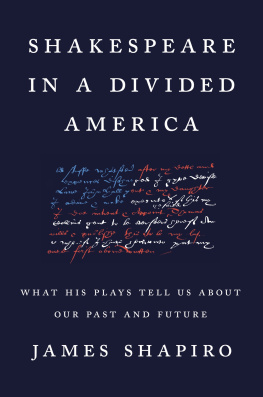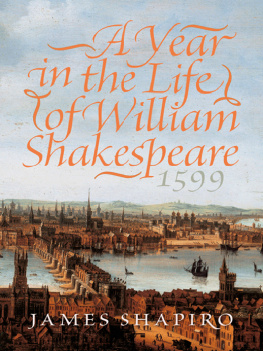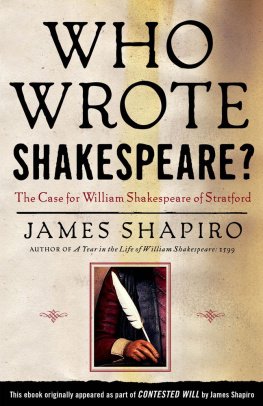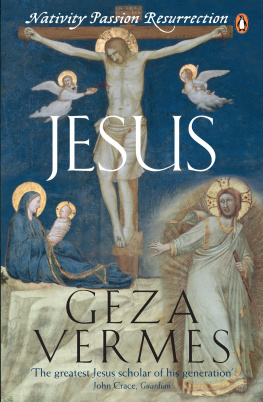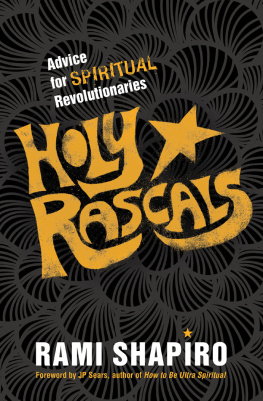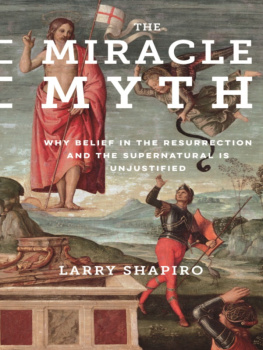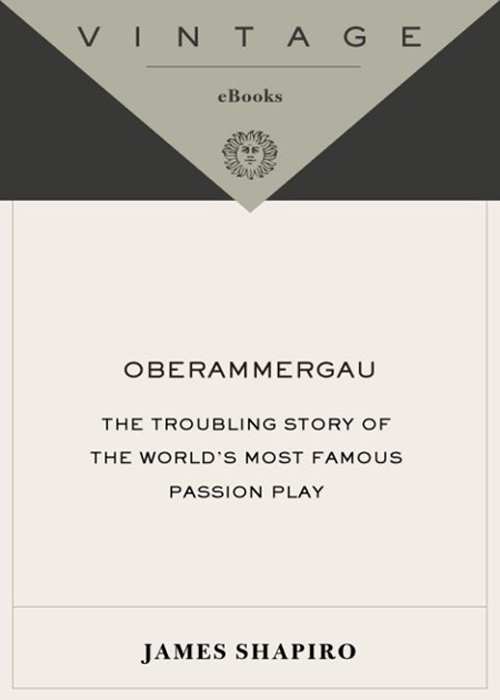
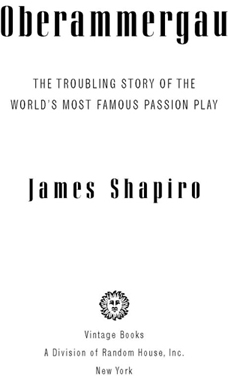
Table of Contents
For Mary and Luke
Acclaim for James Shapiros Oberammergau
A history of the play that is both entertaining and attentive to its questionable aspects.
The New York Review of Books
James Shapiro is... wonderfully knowledgeable.... [His] contribution seems... especially valuable. He knows how to keep his cool, which is a useful talent for anyone who wants to talk about these several issues of religion and bigotry. But most of all, he is able to bring into his discussion a solid familiarity with the folklore of the medieval and postmedieval agea bygone era that, as he carefully demonstrates, is not exactly bygone.
Paul Berman, The New York Times Book Review
The most complete picture to date of the well-attended and now lucrative spectacle that is Oberammergau.... Shapiros work brings the story as up-to-date as any book could possibly hope to be.
Jewish Exponent
It seems only natural while reading Oberammergau to wonder if youre reading Shirley Jacksons The Lottery by mistake.... Fascinating.
The Austin Chronicle
An obsessively readable treatment of this vexed subject. The drama serves as such a perfect metaphor for the anguished and complex problem of Christian anti-Semitism. Shapiro speaks with a scholars authority, but with none of the obfuscation that such scholarship often entails. He sheds a most welcome light on this dark and murky terrain.
Mary Gordon,
author of Final Payments
Engaging [and] informative.
The Jerusalem Report
One of the books deep satisfactions is to watch a work of piety emerge from years of vitriolic bickering and commercial concerns.... Shapiro is especially clear-eyed about the way dramatic imperatives make the Passion play difficult to rescue from its anti-Semitic taint.
Newsday
Shapiro examines the fascinating history of Oberammergau and the implications of the current performance for relations between Jews and Christians worldwide.
The Atlanta Journal-Constitution
An utterly fascinating account of a phenomenon that is at once ephemeral and eternala once-a-decade drama saddled with centuries of passion. With scholarly ingenuity and journalistic wits, Shapiro dissects an event that has, as he himself writes, profound implications for interfaith relations in a post-Holocaust world. This book will go down as a model of cultural commentaryand a treasure.
Stephen J. Dubner,
author of Turbulent Souls: A Catholic SonsReturn to his Jewish Family
Fascinating.
The Dallas Morning News
Oberammergau is an important book for anyone concerned about anti-Semitism; it is an essential book for Christians.... Told with economy and skill.... Almost every page of the book asks a provocative question.... [James Shapiro] is an informed, objective and sensitive guide through a contemporary drama of theological conflict that tends to overshadow the much older drama on stage.
The Trenton Times
Preface
Oberammergau is justly celebrated as one of the few places in the world where theater still matters. Communal and personal identity have become inextricably bound to the Passion play that has been staged in this village, generation after generation, since 1634, and probably longer. Over the past four centuries, millions of visitors have traveled to Oberammergau to see these villagers reenact the suffering, Crucifixion, and Resurrection of Jesus, and most have left profoundly moved by the experience.
Oberammergau is also notorious for staging a play praised by Hitler himself and sharply attacked by Jewish organizationsthat has long portrayed Jews as bloodthirsty and treacherous villains who conspire to kill Jesus. That it is performed in the country responsible for the Holocaust has only intensified this criticism.
As a theater historian I found myself fascinated by the ways in which the tradition of Passion playing in Oberammergau was rooted in the world of medieval and Renaissance drama. But as someone who also writes and teaches about the interplay of art and anti-Semitism, I was disheartened by the ways in which this unbroken tradition had helped sustain the troubling legacy of medieval anti-Judaism. Like Shakespeares The Merchant ofVenice, Richard Wagners music, and Ezra Pounds Cantos, the Oberammergau play appeared to be one of those works of art whose virtues were deeply compromised.
In 1998 I learned that the villagers had voted to let reformersrather than traditionalistsdirect their Passion play in the year 2000. I had also heard that these reformers were interested in ridding the play of its anti-Jewish elements. The questions swirling around the Oberammergau Passion play were ones that I had long been wrestling with: Should offensive art be censored or boycotted? Why did the reconciliation of Jews and Catholics set in motion by Vatican II seem to have ground to a halt? How was one to deal with mutual accusations of collective guilt: that the Jews (as the Passion play had long maintained) were responsible for the death of Jesus, and that the German people were collectively responsible for the Holocaust? The making of the millennial production of Oberammergaus Passion play offered a rare opportunity to confront these issues directly.
Next Year in Jerusalem
Like many others born and raised in the Bavarian village of Oberammergau, Otto Huber leads a double life. When not commuting to nearby Murnau, where he teaches, the fiftythree-year-old Huber is script director of the Oberammergau Passion play. May 2000 will mark the millennial performance as well as the fortieth time that the villagers have staged their playroughly once a decadesince 1634. Since 1996, Huber has struggled to prepare an acceptable script in time for this production, one that audiences find moving, meets the approval of political and religious authorities, and satisfies those critics who have found previous versions of the play tainted by antiSemitism.
Almost half of Oberammergaus 5,200 men, women, and children perform in the play. Eligibility is limited to those born in Oberammergau, those who have lived there twenty years, or those who marry villagers (which cuts this probationary period in half). Even natives who leave to study or work must return a year in advance if they want to be included. The desire to be part of the play is so great that mortality rates dip in the years preceding and rise in those following the play season: the aged and the infirm tend to hold on for one more chance to be involved.
Huber himself first appeared in the play in 1950, at the age of three (illustration 1). That is not unusual. He was carried on stage by his maternal grandfather, Hugo Rutz, who was the Apostle Peter. Until 1990, women who were over thirty-five, married, or widowed were excluded, so little Otto was handed over by his grandfather to the safekeeping of a young unmarried woman who would be his mother in the opening crowd scene in which Jesus enters Jerusalem. When Hubers grandfather lay dying after the conclusion of the 1960 season, he asked on his deathbed that the robes he had worn as Peter be brought to him, and asked his daughter to sing a much-loved song from the play, Heil dir, Heil dir, O Davids Sohn! as he passed away. For many in Oberammergau the play is cradle to grave.
People elsewhere recall the stages of their lives by standard benchmarks: That was the year I got my first job; we got married that year. In Oberammergau, more often than not, these events are connected to the ten-year cycle of the play: Their daughter was born the year her father was Herod; his uncle died the year after he was Annas. And in Oberammergau people dont say someone
Next page

